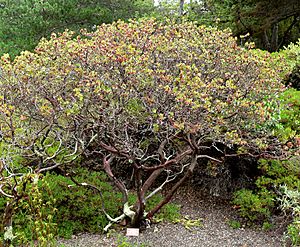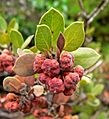Morro manzanita facts for kids
Quick facts for kids Morro manzanita |
|
|---|---|
 |
|
| Conservation status | |
| Scientific classification | |
| Kingdom: | |
| (unranked): | |
| (unranked): | |
| (unranked): | |
| Order: | |
| Family: | |
| Genus: | |
| Species: |
A. morroensis
|
| Binomial name | |
| Arctostaphylos morroensis Wiesl. & B. Schrieb.
|
|
Arctostaphylos morroensis is a special kind of manzanita plant. People often call it the Morro manzanita. This shrub only grows in one small area: San Luis Obispo County, California, near Morro Bay. It's a unique plant found nowhere else in the world!
Contents
Where the Morro Manzanita Lives
The Morro manzanita plant is found in about 18 different spots. In some of these places, there are many of them! But this plant is very picky about where it grows. It needs a special kind of sandy soil called "Baywood fine sands." This sand came from ancient sand dunes long, long ago.
You can find this plant in less than 900 acres of coastal sage scrub and chaparral habitats. Sometimes, it even grows in big groups all by itself on hillsides.
About two-thirds of the places where it grows are on private land. Some of these areas are planned for building new homes or businesses. Because of this, and because it needs such a specific type of soil, the Morro manzanita was listed as a threatened species in 1994. This means it needs protection to survive. Luckily, some of these plants are safe inside Montaña de Oro State Park.
What the Morro Manzanita Looks Like
The Arctostaphylos morroensis is a shrub that spreads out wide. It can grow up to 4 meters (about 13 feet) tall, but it's usually wider than it is tall. It has bark that looks like it's peeling off, with colors of red and gray. Its smaller branches and twigs have tiny, whiskery hairs.
The leaves are shaped like ovals and are a bit curved. They are dark green on top and a duller gray-green underneath. In the winter, many flowers hang in tight bunches. They are usually very light pink, shaped like little urns, and have tiny hairs inside. The fruits are fuzzy red berries, each about one centimeter (less than half an inch) wide. These fruits are called drupes.
Growing Morro Manzanita
People sometimes grow the Arctostaphylos morroensis plant in their gardens. It's a popular choice for landscaping because it's a California native plant. This means it's naturally from California. It's also great for gardens that don't use much water, often called natural habitat or drought-tolerant gardens.
Images for kids





